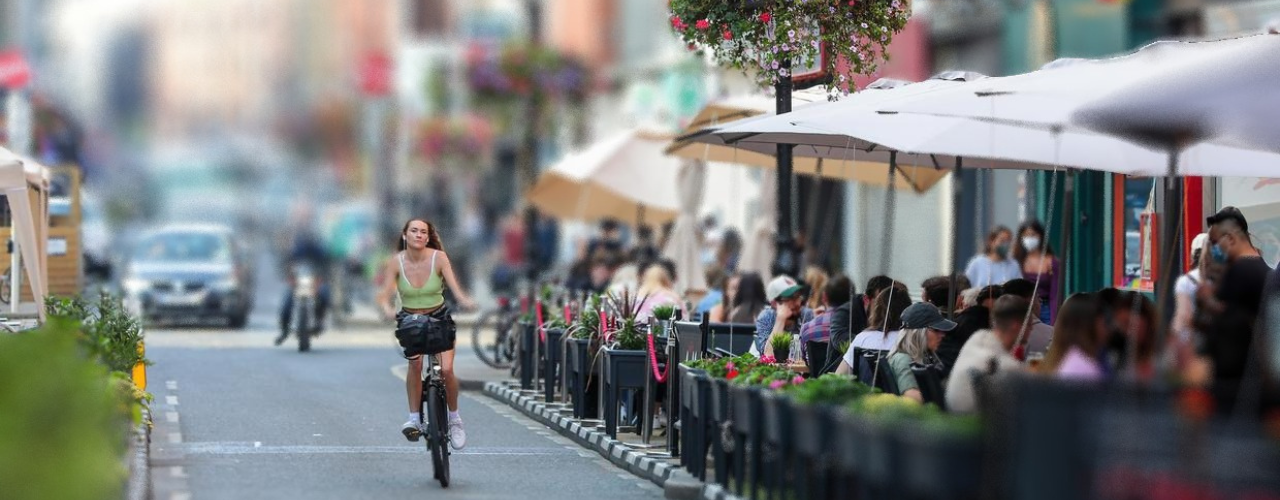
The air we breathe is a shared commodity. We all need it to survive and when it is polluted, we all suffer.
A recently published report from the EPA shows that our air quality is worse than we would like to think. While we have not exceeded our EU targets we did not meet any of the new WHO Air Quality Guidelines for Health in 2021. These new guidelines have been developed to acknowledge the increasingly clear negative impact that air pollutants have on our health.
In Ireland there are an estimated 1,100 premature deaths due to air pollution. It increases the risk of lung damage; long-term exposure can lead to stroke and heart disease. The acrid taste and slight burning of the nose that air pollution causes is unpleasant for all of us, but can be deadly for people with asthma.
Levels of air pollution vary according to the location and the seasons. Where you live or work affects how exposed you are to it, and therefore how much your health is affected. Nitrogen dioxide, which is emitted from petrol and diesel vehicles, is predictably highest in inner-city areas and on busy roads. Particulate matter, which is released through the burning of solid fuels is highest in the winter months and is concentrated in towns and villages which rely mainly on solid fuels for home heating.
People living in inner-city Dublin, for example, are disproportionately impacted by the air pollution caused by people driving into the city for work or education, even though this cohort of the population has the lowest percentage of car ownership in Ireland.
This recognition of air as a shared good, and the inherent inequality in its pollution, comes with a shared responsibility to ourselves and our neighbours. We must act on this knowledge.
Interconnections between air quality, climate and equality
The activities that result in poor air quality are also some of the main drivers of our high carbon emissions. Reducing our dependence on fossil fuels to heat and power our homes, either through retrofitting and insulation or by installing solar panels, not only reduces carbon emissions and air pollution but also reduces fuel poverty. The efforts we make to transform our communities into places where driving is not the only option for transport, where children and adults alike feel safe enough to cycle or walk bring about a myriad of benefits. Not only are people enabled to drive less in favor of active transport but the absence of air pollution and the relative quiet which going hand in hand with removing cars makes our streets and towns simply nicer to be in.
The beneficial consequences of ‘radical’ climate laws
When looking for examples measures to reduce air pollution or to remove cars from our roads, we need look no further than Dublin. The smoky coal ban was passed 32 years ago to combat lethal levels of smog in the city, and its implementation resulted in a 70% reduction in air pollution. The impact of this ban has saved thousands of lives and it remains an example of the radical measures that can be taken when conditions warrant action.
The recent pedestrianisation of Capel Street is another example of how outright banning an activity can lead to beneficial changes in an urban setting. In May, cars were banned from entering Capel street [vehicles were given access to make deliveries from 6 – 11am]. While there are issues to be ironed out in relation to some of the logistics of running businesses there, the vast majority of people surveyed about the project stated that the change has enhanced their experience of the street.
Removing cars means that instead of the street being choked by a constant line of traffic and cars parked on either side, you can now walk or cycle on Capel Street with ease. Without the constant noise pollution from traffic, conversation is easier and the absence of idling engines has made it a healthier environment with cleaner air.
Collective actions make a difference
Reports like the recently published ‘Air Quality in Ireland in 2021’ are all too easy to ignore once the news cycle moves on. But it is our collective responsibility to care for a shared good – our Common Home. While we can take measures to minimise our own emissions, it is our collective actions which make a real difference.
As the public consultation about pedestrianising Capel Street showed, we can work together to make our environments healthier and more enjoyable for everyone.
Let’s pay attention to the reports on our declining air quality, for the sake of our physical health and the health of our society. Campaigning for more pedestrianised spaces, better cycling infrastructure and fewer cars in cities, will benefit us all.

